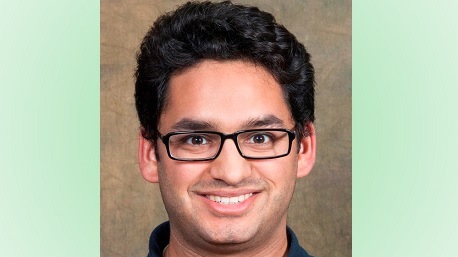
A Wayne State University School of Medicine student has been selected as one of only 79 Howard Hughes Medical Institute Medical Research Fellows for 2017.
Ankush Chandra, M.S., a second-year medical student, will spend the next year conducting in-depth, mentored biomedical research as a HHMI fellow. The program, now in its 28th year, has now selected six WSU School of Medicine students for the fellowship.
His selection means Chandra will miss one year of medical school while he participates as a Hughes Medical Research fellow.
"While I won't be graduating with all my friends, I am humbled to have received this prestigious fellowship and thrilled to pursue this unique opportunity with HHMI," said Chandra, who is originally from Boston. "This program is more than just a fellowship to conduct research. It is a professional development program that trains budding physician-scientists and provides them with the necessary tools to become a successful physician-scientist. It is an honor to be able to train among some of the most talented budding physician-scientists in the nation."
Chandra, who plans to enter the field of Neuro-oncology, Neurology or Neurosurgery, will spend the next year working in the lab of Manish Aghi, M.D., Ph.D., professor of Neurological Surgery at the University of California, San Francisco. Dr. Aghi is a leading expert in glioblastoma microenvironment and protein-protein interactions. Chandra worked in his lab last summer, studying the mechanisms of resistance of glioblastoma to bevacizumab (Avastin), the standard of care for the brain tumor.
Chandra received that opportunity last year by being one of 53 students nationwide selected for a prestigious Carolyn L. Kuckein Student Research Fellowship from the Alpha Omega Alpha Honor Medical Society.
"Dr. Aghi proved to be an ideal mentor to me. He has a proven track record of training a multitude of medical students who have matched in their preferred specialty and successfully achieved their professional goals," Chandra, 27, said. "Moreover, as one of the leading experts in glioblastoma, his research stood out to me and thus I found it very fitting to work with him. My current areas of research revolves around cancer resistance and targeted therapies. I have recently been more interested in glioblastoma and would like to spend more time studying this deadly disease. This coming year will enable me to do so and will help refine my research interests."
Chandra's work in Dr. Aghi's lab will be an extension of the research he conducted there last summer. The lab found a novel biomarker upregulated in bevacizumab-resistant glioblastoma. The biomarker is glucose transporter GLUT3. Chandra and Dr. Aghi found that up regulation of the transporter led to a rewiring of the metabolic circuit of glioblastoma that made them resistant to bevacizumab, but also conferred upon them a more aggressive phenotype with subsequent tumor progression. Preliminarily blocking GLUT3 makes the resistant-phenotype susceptible to bevacizumab. The findings were published in the Journal of Clinical Investigation in January.
"This study may have a significant impact in the development of a new class of drugs that can be used to treat glioblastoma and other deadly cancers dependent on GLUT3," Chandra said.
"At a personal level, conducting research in the field of oncology has been very rewarding. My mother is a breast cancer survivor and I have also witnessed some other family members succumb to cancer," Chandra said.
He began transitioning to oncology research in 2014, while working for Merrimack Pharmaceuticals, a biotech company with a focus on producing targeted cancer therapies. The skills and knowledge he developed there helped him expand his work in the Aghi lab.
Chandra said he would like to thank his WSU mentors, especially Lisa MacLean, M.D., former associate dean of Student Affairs, who wrote a recommendation for the HHMI Fellowship.
In addition to spending a year pursuing basic, translational or applied biomedical research at one of 32 academic or nonprofit research institutions across the United States, each fellow receives $43,000 in grant support. For more information about the fellowships, visit https://www.hhmi.org/news/hhmi-awards-medical-research-fellowships-79-students or https://www.hhmi.org/developing-scientists/medical-research-fellows-program.